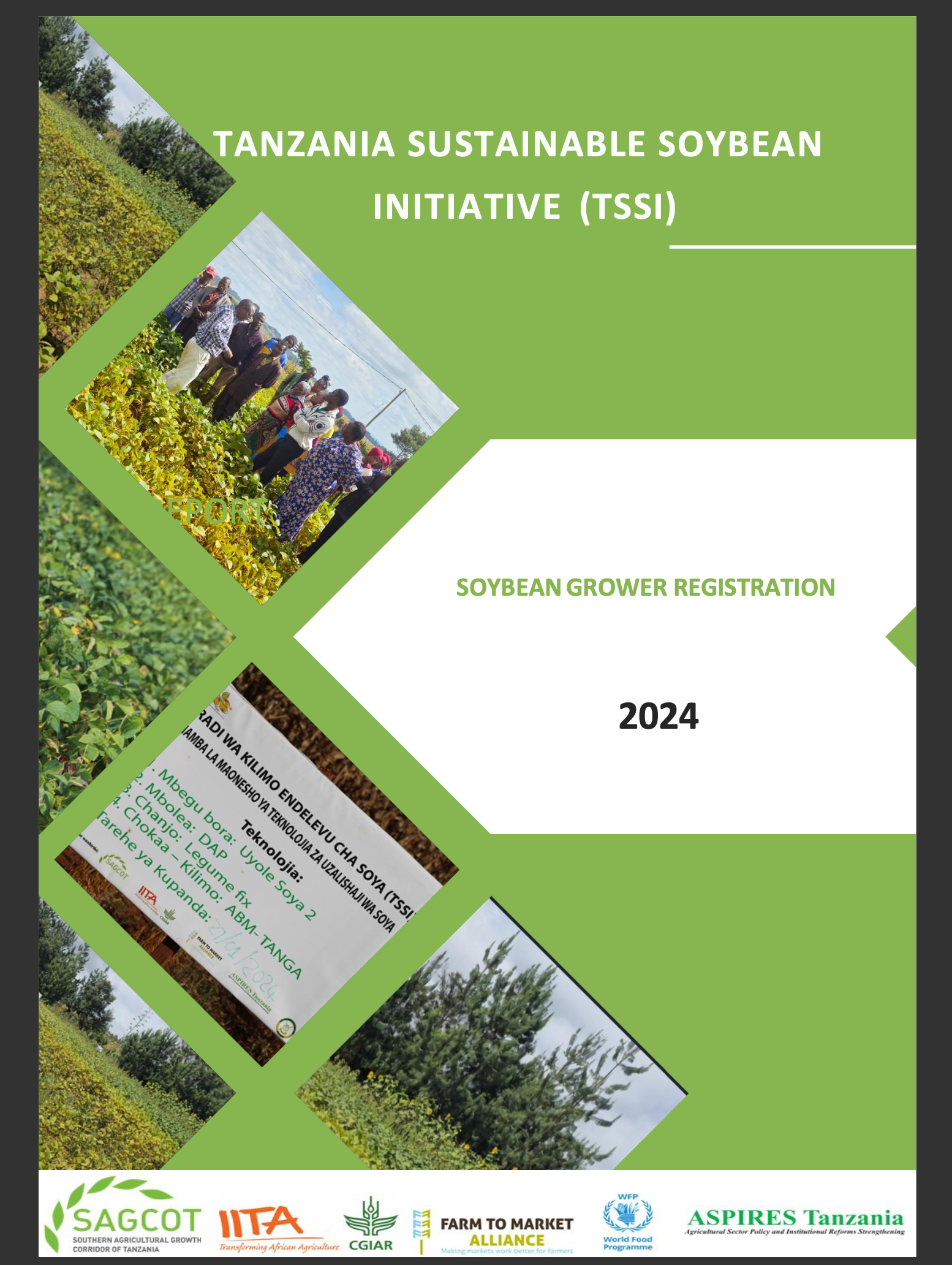Tanzania Sustainable Soybean Initiative (TSSI) Releases Comprehensive 2024 Soybean Grower Registration Report
The Tanzania Sustainable Soybean Initiative (TSSI), under the Southern Agricultural Growth Corridor of Tanzania (SAGCOT), has released its landmark 2024 Soybean Grower Registration Report. This pivotal document offers a comprehensive overview of the opportunities, challenges, and growth potential of soya bean production in Tanzania. Its findings have significant implications for the national and global agricultural landscapes, making it a critical resource for policymakers, development partners, and investors.
A Comprehensive Analysis of Tanzania’s Soybean Sector
Drawing from a dataset of over 20,000 smallholder farmers across Tanzania’s Southern Highlands and Morogoro region, the report provides deep insights into key areas shaping the soybean industry. These include:
- Farmer Demographics: Profiling age, gender, and farming experience to inform tailored interventions.
- Production Practices: Examining trends in farm sizes, yields, and the use of agronomic inputs like seeds, fertilizers, and inoculants.
- Market Challenges: Highlighting barriers to market access, price instability, and low buyer engagement.
- Strategic Clusters: Identifying high-potential production hotspots to focus support and resources effectively.
This report marks a significant step in strengthening Tanzania’s soybean value chain. Spearheaded by TSSI under the SAGCOT umbrella, the initiative is a collaborative effort supported by key partners, including the International Institute of Tropical Agriculture (IITA), the World Food Programme (WFP), and local government authorities. Together, these stakeholders are committed to enhancing sustainable farming practices, building resilience among smallholder farmers, and improving market linkages.
Opportunities and Challenges in Tanzania’s Soybean Sector
Soybean cultivation in Tanzania has gained increasing attention for its potential to address critical issues such as food security, soil health, and farmer incomes. The report highlights this potential, describing soybeans as “a promising crop with the potential to enhance soil health, increase farmer incomes, and contribute to Tanzania’s broader objectives of food and nutritional security.”
However, significant challenges remain:
- Low Productivity: Average yields range between 500 and 1,050 kg/ha, far below the potential of 2,500 kg/ha achievable with improved practices.
- Limited Input Usage: Only 9% of farmers use inoculants, and just 19% apply fertilizers. These figures underscore the need for greater access to and awareness of agricultural inputs.
- Market Barriers: Farmers face difficulties in accessing markets, securing fair prices, and finding consistent buyers, leading to prolonged selling seasons and lower incomes.
Insights from the Foreword
In the foreword to the report, Geoffrey Kirenga, CEO of SAGCOT, emphasized the importance of this study, stating:
“This report presents an in-depth analysis of Tanzania’s soybean farming landscape. It provides crucial insights into farmer demographics, cultivation practices, and market participation, thereby creating a comprehensive view of the sector.”
Kirenga further acknowledged the collaborative efforts of partners such as IITA and WFP, as well as the Royal Norwegian Embassy, whose financial support was instrumental in the success of the TSSI initiative.
Three Key Production Clusters Identified
The report identifies three distinct soybean production clusters, each with unique characteristics and needs:
- Ruvuma Cluster:
- Scale: The largest cluster, with over 10,700 registered farmers producing 4,600 tonnes of soybeans.
- Challenges: Low yields due to extensive farming practices, limited input use, and inadequate agronomic knowledge.
- Opportunities: High farmer density offers potential for resource pooling and reduced transaction costs in marketing.
- Iringa Cluster:
- Scale: A rapidly growing cluster producing 1,500 tonnes of soybeans.
- Advantages: Higher yields (711–926 kg/ha) attributed to more intensive farming practices, better access to inputs, and project-driven interventions.
- Focus Areas: Projects in this cluster emphasize promoting improved seeds, inoculants, and sustainable agronomic practices.
- Songwe Cluster:
- Scale: A smaller, market-driven cluster where farmers are motivated by favorable soybean prices.
- Challenges: Low input utilization restricts productivity, but market proximity offers a competitive edge.
- Potential: Strengthening input access and agronomic training could unlock significant growth in this cluster.
Actionable Recommendations for the Future
The report outlines key recommendations to address the challenges faced by Tanzania’s soybean farmers and capitalise on the sector’s opportunities. These include:
- Expanding Access to Inputs: Increase the availability of high-quality seeds, fertilizers, and inoculants to enhance yields and productivity.
- Improving Agronomic Practices: Provide training to farmers on sustainable farming techniques, pest and disease management, and soil fertility enhancement.
- Strengthening Market Linkages: Develop mechanisms to connect farmers with buyers, stabilize prices, and reduce transaction costs.
- Targeted Support for Clusters: Focus interventions on the identified production clusters to maximize impact and efficiency.
As noted in the foreword:
“By addressing input gaps, improving agronomic practices, and enhancing market access, we can unlock the full potential of soybeans as a critical crop for income generation, soil fertility improvement, and food security in Tanzania.”
A Collaborative Effort
This initiative’s success is attributed to multiple stakeholders’ collective efforts. SAGCOT extends its gratitude to the International Institute of Tropical Agriculture (IITA), the World Food Programme (WFP), and the Royal Norwegian Embassy for their financial and technical support. Special thanks are also due to the government extension officers who played a vital role in registering and profiling the farmers.
Looking Ahead
The release of the 2024 Soybean Grower Registration Report is a milestone in Tanzania’s agricultural transformation. It offers a roadmap for achieving sustainable growth in the soybean sector and demonstrates the power of data-driven interventions.
This report will serve as a valuable resource for policymakers, investors, development partners, and other stakeholders as they work together to build a resilient and prosperous soybean industry in Tanzania.
